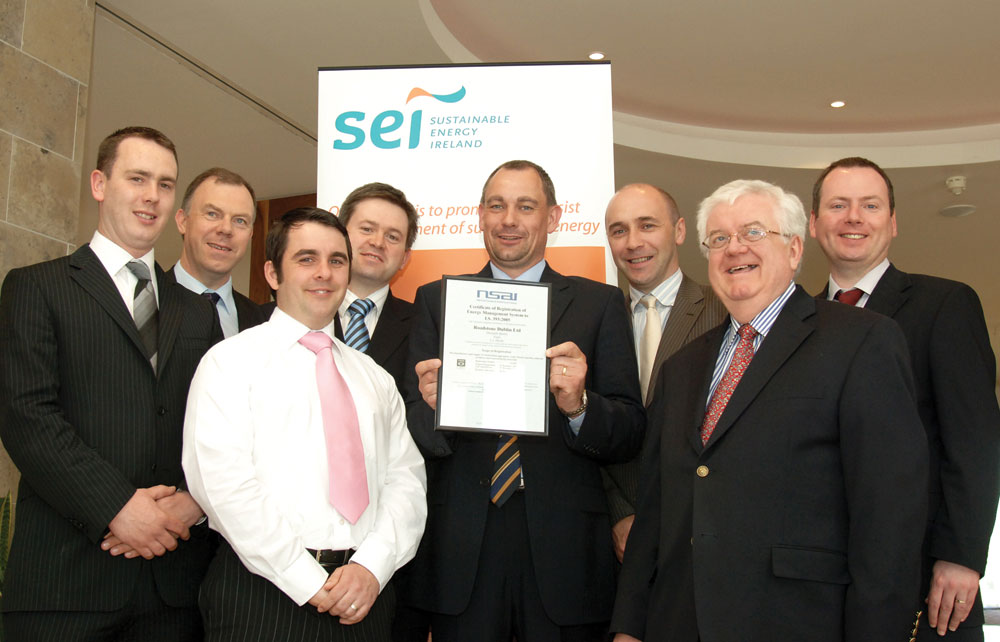Improved Energy Performance At Roadstone Dublin

CRH subsidiary becomes the first quarry company in Ireland to achieve new IS393 Energy Management System accreditation
Roadstone Dublin Ltd, a wholly owned subsidiary of Ireland’s largest listed company, CRH, have become the first construction and quarrying company to achieve Sustainable Energy Ireland’s IS393 Environmental Management rating for a pilot project launched at one of their quarry facilities. In doing so, the Roadstone team has reduced energy consumption at the site by 10% and plans are already in place to implement the certification standard across another eight CRH locations in Ireland.
The IS393 Energy Management Standard has been established to recognize standards achieved by businesses that have created systematic approaches for improving their energy performance on a continuous basis. It specifies the requirement for continuous improvement through using energy more efficiently.
In their pursuit of accreditation to IS393, Roadstone Dublin established the pilot project at Slane Quarry in Co. Meath. To achieve accreditation, the company was required to implement, maintain and improve an Energy Management System for all energy-consuming aspects of the operation, from front-end quarrying activities, such as the use of explosives, to back-end business-support and administration services.
As an initial step, Roadstone Dublin worked with Sustainable Energy Ireland to develop an analysis of the existing energy-consuming systems as the site, ranging from the machinery used in the extraction and processing of rock to the daily consumption of energy at the site’s offices and administration centre, eg lighting, office equipment etc.
Next, a number of key performance indicators (KPIs) were assigned to all energy-consuming areas of the operation, the aim of which was to measure the energy consumption over time and to monitor any improvements which might result from the implementation of new work practices.
On planning these indicators, it became clear to the quarry’s management team that they could group their activity into three clearly distinguished energy-reduction projects:
- Reduction of fuel usage – fuel represents the largest amount of energy consumed at Slane, ranging from the fuel used in the production of blacktop products to the fuelling of vehicles used to transport extracted material from the site. A KPI based on ‘number of litres used per tonne’ was instigated to monitor and improve fuel consumption.
- Efficient use of explosives – as part of the extraction process, Slane Quarry uses explosives to reduce the size of the raw material for subsequent processing. Historically, larger rocks often required further mechanical reduction in order to meet the requirements of these downstream processes. Under the new Energy Management System, a recalibration of the explosives used at the site has greatly reduced the need for any further mechanical reduction.
- Use of lighting – from lighting in the quarry itself to lighting in the quarry offices, a full analysis was carried out and KPIs established to reduce the amount of energy consumed.
As well as installing the new KPI measurements at the quarry, Roadstone also began a process to educate and assist employees in terms of the contribution they could make to ensure that IS393 accreditation was reached.
Ronan Griffin of CRH explained: ‘Obtaining IS393 is not simply a project; it’s an ongoing programme which requires each of us on the Roadstone Slane Quarry team to monitor how we use all types of energy and seek to reduce, or make more efficient, the use of that energy.
‘Although people are increasingly aware of the need to be energy efficient at home, a certain culture change first needed to take place here in the quarry to encourage people to bring that same energy awareness into the workplace. Education and training were key to making this a reality.’
A number of activities, including education campaigns and employee briefings, have been utilized by the management at Slane to support and encourage employees to become more energy aware at work, while also clearly outlining the benefits which this can bring to their business.
‘Everyone should be aware that…any business which depends on energy consumption needs to take achievable and measurable steps toward reducing fuel bills and emissions,’ said Mr Griffin. ‘That’s what we have achieved and continue to achieve in terms of IS393.’


